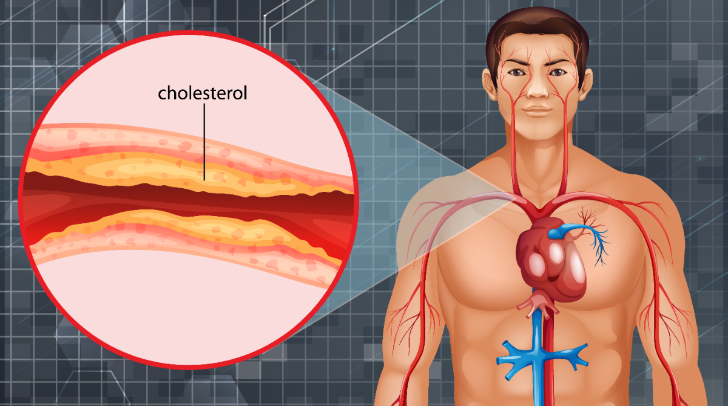Taking care of health is crucial, and one major concern for many is cholesterol. Apart from factors like sugar, kidney function, liver health, and gut health, cholesterol levels are always a worry. It's a fatty substance in the blood essential for cell building and hormone production. High cholesterol levels can raise the risk of heart disease and stroke. Cholesterol travels through the bloodstream attached to proteins called lipoproteins. Cholesterol has two types: LDL (low-density lipoprotein) and HDL (high-density lipoprotein), known as 'bad' and 'good' cholesterol. Connector explores cholesterol deeply, understanding LDL and HDL and focusing on how lifestyle changes can help maintain healthy levels for better heart and overall health.
Sharing inputs on this, Dr Noor Naji, Internal Medicine and Obesity Medicine Consultant at Mubadala Health Dubai and Danat Al Emarat Hospital said, "Cholesterol might often have negative associations, but the fact is, there are both good and bad types. The trick is to balance them to ensure cardiovascular health. Cholesterol is a waxy, fat-like substance found in all the cells of the body and plays several crucial roles in maintaining health. It is a key component of cell membranes, providing structural integrity and fluidity. It also serves as a precursor for the synthesis of steroid hormones, including cortisol, aldosterone, estrogen, testosterone and progesterone."

Sources Of Cholesterol And Its Need
Cholesterol has two key sources: your liver produces the cholesterol your body needs, while additional cholesterol comes from animal-based foods like meat, poultry, and dairy products. These foods can also be high in saturated and trans fats, which further increase cholesterol levels. For some individuals, consuming these fats can shift their cholesterol levels from normal to unhealthy. Tropical oils like palm oil, palm kernel oil, and coconut oil contain saturated fats that can elevate cholesterol levels, commonly used in baked goods.
Speaking to Connector, Dr Noor Naji from Mubadala Health Dubai and Danat Al Emarat Hospital mentioned when the skin is exposed to sunlight, cholesterol is converted into vitamin D, vital for bone health and immune function. Additionally, cholesterol is used to produce bile acids, critical for digestion and the absorption of dietary fats and fat-soluble vitamins (A, D, E, and K).
Types Of Cholesterol
Cholesterol is characterised into two types- LDL referred to as bad cholesterol, and HDL referred to as good cholesterol.
LDL cholesterol contributes to the build-up of fatty deposits in arteries, a condition known as atherosclerosis. This narrowing of arteries increases the risk of heart attack, stroke, and peripheral artery disease.
HDL cholesterol, known as good cholesterol, protects your heart health. HDL functions by transporting LDL cholesterol away from arteries and back to the liver for processing and elimination from the body. Although HDL doesn't completely remove LDL cholesterol, it helps in reducing its levels by facilitating its breakdown in the liver. Having high levels of HDL is beneficial for overall heart health, making it a key focus in monitoring cholesterol levels.
Dr Sachin Upadhyaya, Cardiology (Specialist), Aster Hospital, Mankhool, adds, "HDL cholesterol, often known as 'good cholesterol,' acts as a shield against heart attacks and strokes by removing LDL from the bloodstream through liver metabolism. In contrast, LDL is dubbed 'bad cholesterol' for its tendency to accumulate in arteries, narrowing blood vessels and diminishing blood flow to vital organs, thereby increasing the risk of heart attack, stroke, and other serious conditions."
What Test Is Needed To Understand The Cholesterol Levels
Analysing cholesterol is essential for everyone, particularly if you live a stressful lifestyle and frequently consume high-fat meats and fried foods. It's crucial to monitor your cholesterol levels closely in such cases. Checking cholesterol is a routine part of health check-ups, where a healthcare provider performs a blood test called a lipid panel or lipid profile. Typically, you'll need to fast for 12 hours before the test, refraining from consuming anything except water.
Highlighting the importance of getting tests done, Dr Noor Naji from Mubadala Health Dubai and Danat Al Emarat Hospital adds, "Regular check-ups are crucial for managing cholesterol levels and reducing associated health risks. Lipid panel tests in routine screenings detect high cholesterol early. These appointments enable healthcare providers to assess cardiovascular risk factors, offer personalised advice on diet and exercise, adjust medication as needed, and detect early signs of high cholesterol."
When To Get The Test Done
The frequency of cholesterol level checks varies based on factors like age, gender, family history, lifestyle, and individual health considerations. Generally, adults are advised to undergo testing annually, while children may have tests scheduled every three years. Your healthcare provider is best suited to determine the appropriate testing interval tailored to your specific health needs.
"Regular check-ups help monitor cholesterol levels and provide timely advice on lifestyle adjustments and medication for cholesterol management, ensuring proactive health care and heart disease prevention," adds Dr Sachin Upadhyaya from Aster Hospital, Mankhool.
Sources Of Good And Bad Cholesterol
Good sources of cholesterol-friendly nutrients include healthy fats such as monounsaturated fats found in olive oil, canola oil, and avocados, as well as polyunsaturated fats like omega-3 fatty acids found in fatty fish such as salmon, mackerel, sardines, and trout.
Additionally, high-fibre foods like oats, barley, beans, lentils, fruit, vegetables, nuts and seeds such as almonds, walnuts, flaxseeds, and chia seeds contribute positively to cholesterol levels.
Conversely, sources of unhealthy cholesterol include saturated fats found in red meat, lamb, processed meats, dairy products like butter, cheese, cream, and whole milk, and tropical oils such as coconut oil, palm oil, and palm kernel oil. Trans fats, found in many commercially baked goods, fried foods from fast-food outlets, and margarine, also negatively impact cholesterol levels. Dietary cholesterol, present in egg yolks, shellfish, organ meats like liver, and certain dairy products, should also be moderated for cholesterol management.
.jpg)
Factors That Contribute To Bad Cholesterol Levels
Besides dietary choices, several other factors contribute to high cholesterol levels. Obesity, defined by a Body Mass Index (BMI) of 30 or higher, increases the risk significantly. Lack of exercise lowers good cholesterol levels, while smoking facilitates bad cholesterol build-up in arteries.
Excessive alcohol consumption can elevate overall cholesterol levels. Age also plays a role; cholesterol issues are more common in individuals over 40, as the liver becomes less efficient at processing LDL cholesterol.
Tips To Maintain Healthy Cholesterol Levels
- Choose lean meats and trim visible fat to reduce saturated fat intake in your diet.
- Opt for low-fat or fat-free dairy products instead of full-fat varieties to lower your cholesterol consumption.
- Use healthy oils like olive oil or canola oil in cooking instead of butter or lard.
- Avoid processed and fried foods that contain trans fats by checking labels for partially hydrogenated oils.
- Increase your soluble fibre intake by incorporating oats, barley, whole grains, beans, lentils, fruits, and vegetables into your meals.
- Include fatty fish such as salmon twice a week, and add nuts, seeds, and avocados to your diet for beneficial healthy fats.
"Boost your diet with more fruits and vegetables, incorporate foods that elevate good cholesterol levels, decrease consumption of red meat, fried, and oily foods, quit smoking and alcohol, and commit to a daily 30-minute walk at least five days a week for a healthier lifestyle," recommends Dr Sachin Upadhyaya from Aster Hospital, Mankhool.
Lifestyle Changes To Make For Cholesterol
First and foremost, avoid a sedentary lifestyle; the more active you are, the better your heart health will be. Engage in exercises that interest you, such as sports, dance classes, or Zumba, to keep your body moving. Combining regular physical activity with a healthy diet is key to maintaining optimal heart health.
Dr Noor Naji from Mubadala Health Dubai and Danat Al Emarat Hospital highlights the importance of lifestyle changes in improving cholesterol levels, such as regular physical activity (aim for 150 minutes of moderate aerobic exercise or 75 minutes of vigorous exercise weekly), maintaining a healthy weight, and avoiding smoking. Dr Noor Naji from Mubadala Health Dubai and Danat Al Emarat Hospital notes, “For some, additional measures like statin medication may be necessary alongside lifestyle adjustments."

Conclusion
To lead a healthy life, prioritise regular health check-ups, stay physically active, and monitor your cholesterol levels. Even if your LDL cholesterol levels are high, you can manage them effectively through a balanced diet, exercise regimen, and guidance from your healthcare team. By making informed lifestyle decisions and cooperating closely with your healthcare provider, you can greatly reduce the likelihood of heart disease and other critical health issues linked to elevated cholesterol levels.